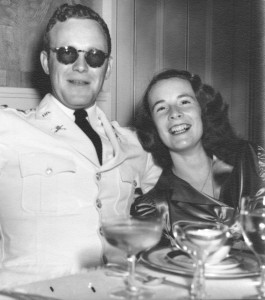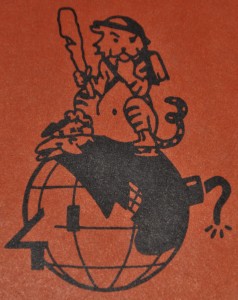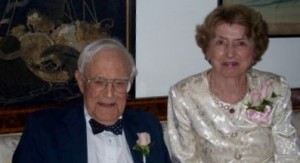Note: My father, Gordon T. Kinder, died a year ago today. In his memory, I am publishing three pieces in this blog. The first is a lightly edited version of a note I published in the Princeton University Class of 1970 Fortieth Reunion Book. The second is his memorial prepared by a member of his Princeton class which appeared in the Princeton Alumni Weekly. The third is an obituary I wrote for the Martins Ferry-Bellaire (Ohio) Times-Leader.
My Annus Mirabilis: 2009
I’m sorry I will miss our 40th reunion. I will be in the Ohio town where I grew up for a memorial service for my father, Gordon T. Kinder ‘41.
I was born nine months after my father returned from World War II. He looked and acted the young captain into his 91st year: trim, authoritative, humorous, organized.
When Claudia Prout Casey and I decided to marry, we suggested to father we’d like to wed in Naples, Fla., where he lived, since he couldn’t travel. He had seemed quite poorly at Christmas 2008. The suggestion pushed off his ills.
I would exaggerate only a mite to say the location was the last decision we made about our joyous, perfect wedding which took place in his living room on March 28, 2009.
***
After graduating law school in 1948, my father had practiced law, not very happily, for 25 years. He had taken on a few directorships as part of his work. Then, an uncle’s unexpected death forced him to take over and run the type of small, midwestern manufacturer the Reagan-Bush I economic, labor and trade policies doomed.
Using this company as a base, he built a small conglomerate of similar companies. The business succeeded, and he sold it 15 years later. He thoroughly enjoyed the challenges.
His advice when I took over in 2001 day-to-day operations of KLD Research & Analytics, a company I co-founded in 1988, was spot-on. Whether the subject was contracts, personnel, investment bankers, mergers or sales, his experience informed his always pro-active advice.
We talked business at least once a week until the month before his death on December 17, 2009. Forty-five days before, we had celebrated KLD’s sale on October 30 to RiskMetrics Group and my very semi-retirement.
***
Despite a lifetime of injuries and illnesses, my father loved physical activity – from working in vegetable gardens (and mobilising his four serfs – sons – to the tasks) to searching cornfields for arrowheads and artifacts to horseback riding to vigorous walks. But above all else, he loved to play golf.
I had avoided playing golf because it exposed my utter lack of co-ordination. I found when my older son was born in 1982 a sport I both enjoyed and was good at. I discovered biking out of necessity; I pedaled him to and from daycare.
Over 25 years of biking, I’d had two serious accidents. On May 10, 2009, I had a third. Anyone who considers not wearing a helmet for biking or riding should ask me why I fully recovered from all three. But the third will be my last. If you have been injured in similar accidents caused by a negligent party, you should consider searching online for ‘personal injury lawyers in my area’.
Three weeks later, Claudia moved from Peapack, N.J., into our Cambridge flat. To this effort I contributed my seminal ‘House’ impersonation, grumpily supervising whilst leaning on a cane popping prescribed painkillers.
Like my father, Claudia is a skilled, devoted golfer. In late July I took my first golf lesson at Ekwonek near our house in E. Dorset, Vermont. My father laughed uncontrollably at the news. He then offered advice about my swing, concentration and ball control, none of which he’d seen….
***
Mainly unconsciously, in my first 35 years I took my father as a role model. Like many WWII vets, he returned determined to make up for lost time. He worked long, intense hours aided by the ever-lit Salems my mother loathed. From Robert Young to Fred MacMurray, the sit-com dads were foreign to my experience – or even observation.
He did not neglect his family and extended family by any standard. But he missed out on 30+ years of interaction with his sons until a near-fatal heart attack refocused his attention. Over his last 30 years, he became deeply involved in the lives of his children and grandchildren.
I gave up smoking (with occasional slips) about the same time he did. I resolved with son Jotham’s arrival I would involve myself actively in my children’s lives. As every stay-at-home mother will admit, this is not a cost-free decision. And I paid some. But the benefits in the form of happy relations with Jotham and his wife, Genevieve, and John and his long-time girlfriend, Kristen….
***
Claudia and I were walking the beach in Naples when the hospice nurse called. The bright sun lit the shorebirds massed to feed on fingerlings.
It was a day my father would have savoured. It was a day like today in Nassau where I look out at a mottled turquoise bay guarded from the deep blue waters by a reef marked by breakers.
I felt relief and release. Old age is better than the alternative only sometimes. Diverticulitis, kidney failure (followed by four and a half years of dialysis), macular degeneration and deafness marked his last seven years.
In our regular telephone calls, I would free associate during his descriptions of maladies and malpractice. A ‘mushy abscess’ led me to think of ‘Cream of Mush’ which Cary Grant pushes in ‘Mr. Blandings Builds his Dream House’. I relayed the thought and how disgusting I found mush. He disagreed strongly, and for a half hour a youthful voice recalled Maryland breakfasts, his battalion’s officers’ mess at Ft. Sill and, most importantly, his mother’s table.
The gathering darkness, the isolation, the humiliations of his last years were made worse by the perversions, depredations and sheer classlessness of our George III and the people who profited from him. Nothing disturbed him more than the corruption of our legal system in the name of ‘security’ gained by torture.
Two things kept him going. First above all, his extended family. But almost as important were the network of people he saw on his daily excursions – from gardeners to drivers to nurses. He knew their names, their stories, their cares. They looked forward to his sly jokes and funny stories, but most of all his smile – his mother’s smile. They would do anything for him.
One morning last July I sat with him on a bench – like Simon & Garfunkle’s ‘Old Friends’ – outside his flat waiting for his ride to dialysis. ‘You know,’ he said as the hearse-coloured car came into view, ‘I just treat it like a job. You go in. You get it done. You go home.’
The Chevy arrived. Kim, the driver, stopped the car and sprung out of her door. ‘Good morning, Gordon!’ she halloed. She hurried to take my father’s free arm as he walked to the car. He didn’t need the help, but she wanted the immediate contact, the morning’s first laugh. My father’s thoughtful expression of two minutes before had dissolved into pleased satisfaction. The co-workers waved as they drove off.
I’ve thought about those seven minutes many times in the last ten months. There’s not much more a father can teach his son.
***
He loved the outdoors, this old Eagle Scout. Until his last decade, he made his Army experiences sound like extended hikes through interesting country with great pals.
I’d given father a copy of Stephen Ambrose’s then brand new Band of Brothers for Christmas. He read it in less than a day, then spent the next tracking down members of the 101st Airborne to see what they’d told Ambrose. His battalion which was next to the Band had gotten slighted, he believed. From this came new friendships and visits north and south.
As the stories came out and pictures appeared, I realized that the lessons I’d drawn were not the ones we’d talked about.
My long-time friend and former KLD director, Charlie Kireker ‘72, and I have debated which class has the all-time best beer-jacket logo.
I hold out for my father’s class of ‘41. From a distance, it looks like a globular bomb with a sputtering fuse. Closer up, one can see Hitler’s profile in black and Roosevelt’s in outline about to swallow Hitler.
Books, tours of battlefields and memorials, and old soldiers’ musings offered my only exposure to war. That privilege is what my father’s generation bought me. But that’s a profoundly simplistic, reductionist view of a very complex heritage.
Yes, my father and two of my three uncles saw heavy action in WWII. But all four of my grandparents had opposed – for differing reasons – US involvement of any sort in the war up to Pearl Harbor. None was a pacifist.
I learnt from my father that there are some things that are black and white, like Hitler and Roosevelt in the logo. But recognizing those and making calls on the infinite number of issues that aren’t clear cut demand knowledge of facts, consideration of precedent and above all openness to new perspectives.
Perhaps it was this experience that made him insistent on maintaining standards while learning and adjusting opinions to new facts. He loved conversation, to learn others’ stories and views. Few ardent Democrats have had as many Republican friends as he had.
His views on what was right and wrong in the practice of law and in business did not change. But his views on law firms, corporations and their interactions with society could not have changed more profoundly over his last 40 years.
-30-
He came to Princeton from Gilman School and majored in art and archaeology, graduating with honors. He was a member of Charter Club and ROTC. Gordy served 23 months in the European theater as an Army liaison officer in a separate battalion of 105mm howitzers, fighting from Normandy to Saltzburg, Austria, and earning five battle stars on his ETO ribbon, the Bronze Star, and the Pre-Pearl Harbor ribbon. He was separated as a major.
After graduating from the University of Virginia Law School in 1948, he joined his father’s law firm in Martins Ferry, Ohio. He continued his law practice until retirement in 1980. He served as chairman of the board of Wheeling Pittsburgh Steel Co. and also was on the boards of Wheeling Stamping Co. and Thatcher Manufacturing Co.
Gordy served on the boards of several nonprofits, including the First Presbyterian Church in St. Clairsville, the National Presbyterian Church, and what is now Wheeling Jesuit University.
Gordy is survived by his wife of 20 years, Suzanne Fonay Wemble Kinder; his sons, Peter ’70, Dan ’72, Tom ’77, and George; and eight grandchildren. His first wife, Cary Stuckey Kinder, died in 1988.
The Class of 1941
-30-
For the Martins Ferry Bellaire (Ohio) Times-Leader:
Gordon Thomas Kinder, formerly of St. Clairsville, died December 17, 2009 in Naples, Florida.
Born May 13, 1919, Mr. Kinder grew up in the Kirkwood and Brookside neighborhoods of Bridgeport, the son of Gordon D. and Charlotte Duncan Kinder. He graduated from the Gilman School in Baltimore, MD and Princeton University.
In World War II he served as a Captain in the Field Artillery and saw action in France, Germany and Austria. He returned to his education, taking a law degree from the University of Virginia in 1948.
He returned to join his father in his law practice in Martins Ferry, and later in St. Clairsville. The firm became Kinder, Kinder & Kinder when his younger brother, John, joined them. He served in that firm until his retirement in 1992. As a small town lawyer, he practiced a wide range of law over his career.
In the mid-1960s, Mr. Kinder began serving on nonprofit boards ranging from the First Presbyterian Church in St. Clairsville and the national Presbyterian church to what is now Wheeling Jesuit University and the Naples (Florida) Nature Conservancy.
He was a long time member of the Twilight Club and the Belmont County Bar Association.
Mr. Kinder developed a strong interest in business organizations as a board member in the 1960s of Wheeling Pittsburgh Steel and Pipe Coupling Manufacturing. He later served as board chair of the Wheeling Stamping Co. and Thatcher Manufacturing in Muscatine, Iowa.
Unlike Will Rogers, he had met in his 90 years some people he didn’t like, but they were far fewer than those who counted him a friend. In a lifetime marked by many health problems, fellow patients and health-care professionals alike took heart from his spirit and resilience.
Mr. Kinder was a life-long Democrat, a proud Ohioan and a man of broad interests he loved to discuss. At age 89 he wrote and published a 365-page memoir and family history.
He is survived by his wife of 20 years, Suzanne Fonay Wemple Kinder, of Naples, Florida; and by four sons, Peter of Cambridge, MA, George of Littleton, MA, Dan of Newport RI, and Tom of Strafford, VT, and nine grandchildren.
His wife of 36 years, Cary Stuckey Kinder, died in 1988.
A memorial service will be held Saturday, May 29, 2010 at 11:00 AM at the First Presbyterian Church in St. Clairsville, followed immediately by a service of Committal at Union Cemetery, the Rev. Thomas Cary Kinder presiding.
He came to Princeton from Gilman School and majored in art and archaeology, graduating with honors. He was a member of Charter Club and ROTC.
Gordy served 23 months in the European theater as an Army liaison officer in a separate battalion of 105mm howitzers, fighting from Normandy to Saltzburg, Austria, and earning five battle stars on his ETO ribbon, the Bronze Star, and the Pre-Pearl Harbor ribbon. He was separated as a major.
After graduating from the University of Virginia Law School in 1948, he joined his father’s law firm in Martins Ferry, Ohio. He continued his law practice until retirement in 1980. He served as chairman of the board of Wheeling Pittsburgh Steel Co. and also was on the boards of Wheeling Stamping Co. and Thatcher Manufacturing Co.
Gordy served on the boards of several nonprofits, including the First Presbyterian Church in St. Clairsville, the National Presbyterian Church, and what is now Wheeling Jesuit University.
Gordy served 23 months in the European theater as an Army liaison officer in a separate battalion of 105mm howitzers, fighting from Normandy to Saltzburg, Austria, and earning five battle stars on his ETO ribbon, the Bronze Star, and the Pre-Pearl Harbor ribbon. He was separated as a major.
After graduating from the University of Virginia Law School in 1948, he joined his father’s law firm in Martins Ferry, Ohio. He continued his law practice until retirement in 1980. He served as chairman of the board of Wheeling Pittsburgh Steel Co. and also was on the boards of Wheeling Stamping Co. and Thatcher Manufacturing Co.
Gordy served on the boards of several nonprofits, including the First Presbyterian Church in St. Clairsville, the National Presbyterian Church, and what is now Wheeling Jesuit University.
After graduating from the University of Virginia Law School in 1948, he joined his father’s law firm in Martins Ferry, Ohio. He continued his law practice until retirement in 1980. He served as chairman of the board of Wheeling Pittsburgh Steel Co. and also was on the boards of Wheeling Stamping Co. and Thatcher Manufacturing Co.
Gordy served on the boards of several nonprofits, including the First Presbyterian Church in St. Clairsville, the National Presbyterian Church, and what is now Wheeling Jesuit University.



Recent Comments